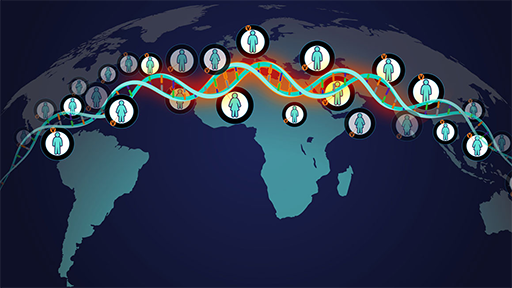Members of the Polygenic RIsk MEthods in Diverse populations (PRIMED) Consortium will work together to develop and implement approaches to integrating extant genotype and phenotype data for the purpose of conducting and disseminating Consortium-wide PRS analyses.
Grantees
| Institution (Contact PI) | PIs | Title |
| University of Maryland, Baltimore | Sally Adebamowo*, Michele Ramsay, Bamidele Tayo | Polygenic Risk Score (PRS) Methods and Analysis for Populations of Diverse Ancestry — Study Sites |
| University of Southern California** | David Conti*, John Witte | Leveraging Diversity in Cancer Epidemiology Cohorts and Novel Methods to Improve Polygenic Risk Scores |
| Massachusetts General Hospital | Amit Khera | Enabling Improved Applicability and Transferability of Polygenic Scores Across Diverse Populations: A Focus on South Asians |
| Mayo Clinic, Rochester, Minnesota | Iftikhar Kullo*, Daniel Schaid | Polygenic Risk of Disease in Populations of Diverse Ancestry |
| UNC-Chapel Hill | Yun Li*, Alexander Reiner, Nancy Cox | Polygenic Risk Scores and Health Disparities: The Role of Blood Cells Immune Response and Evolutionary Adaptation |
| Broad Institute, Cambridge | Josep Mercader*, Maggie Ng, Alisa Manning | Development of Polygenic Risk Scores for Diabetes and Complications Across the Life-Span in Populations of Diverse Ancestry |
| University of California, Los Angeles | Bogdan Pasanuic*, Eimear Kenny, Leslie Lange | PRS Center for Admixed Populations and Health Equity (CAPE) |
| University of Washington | Ken Rice*, Sarah Nelson, Matt Conomos, Ben Heavner | Coordinating Center |
*Contact PI
**Co-funded by NCI
Program Staff
Program Directors

Erin M. Ramos, Ph.D., M.P.H.
- Director
- Division of Genomic Medicine

Robb Rowley, M.D.
- Program Director
- Division of Genomic Medicine

Mollie Minear, Ph.D.
- Program Director
- Division of Genomic Medicine

Rachel Hanisch, Ph.D., M.P.H.
- Program Director
- Division of Cancer Control and Population Sciences

Leah Mechanic, Ph.D., M.P.H.
- Program Director, Division of Cancer Control and Population Sciences
- Division of Cancer Control and Population Sciences
Program Analysts
Last updated: December 20, 2024

